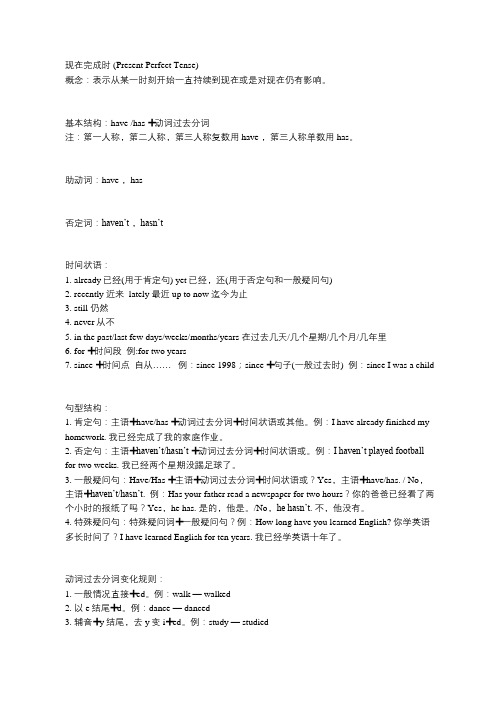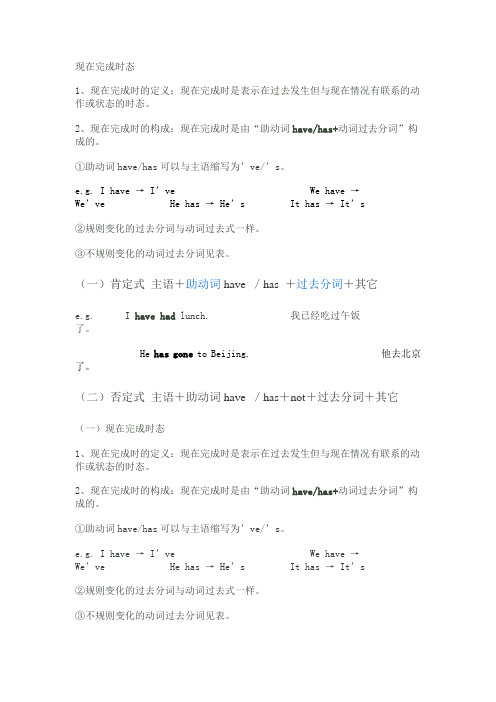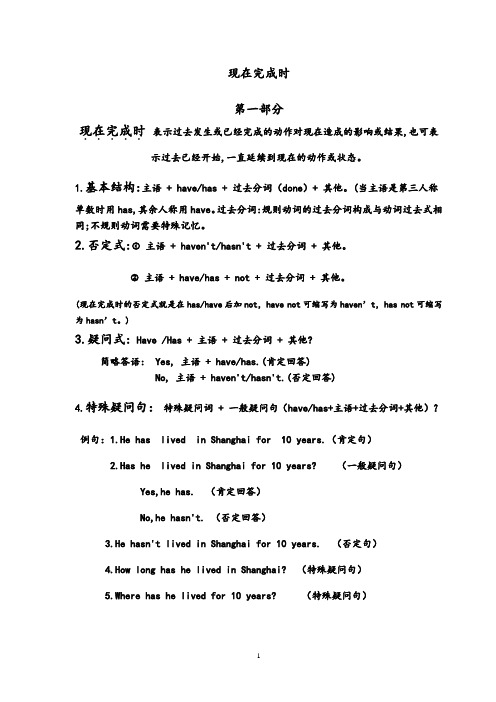现在完成时
英语现在完成时语法讲解

英语现在完成时语法讲解英语现在完成时(Present Perfect Tense)是用来表达过去发生的动作或状态与现在的关系的一种时态。
它由“have/has + 过去分词”构成。
现在完成时常用于以下几种情况:1. 表示过去发生的动作对现在造成的影响或结果。
例如:I have lost my key.(我把钥匙弄丢了。
)这里的“have lost”表示过去发生的动作,但是现在没有钥匙导致现在的结果是找不到钥匙。
2. 表示过去发生的动作在现在仍然持续或重复。
例如:He has lived in London for five years.(他在伦敦住了五年了。
)这里的“has lived”表示过去开始的动作,但是他至今仍然住在伦敦。
3. 表示过去发生的动作在现在刚刚完成。
例如:She has just finished her homework.(她刚刚完成了她的作业。
)这里的“has just finished”表示刚刚完成的动作。
4. 表示过去发生的动作在现在的时间段内发生多次。
例如:I have visited Paris many times.(我去过巴黎很多次。
)这里的“have visited”表示过去的多次动作在现在的时间段内持续进行。
需要注意的是,现在完成时与具体的过去时间点无关,而与现在的状态或结果相关。
此外,现在完成时也可以与一些时间状语连用,如just(刚刚)、already(已经)、yet(还)等,以更准确地表示动作发生的时间。
下面是一些现在完成时的例句:- I have finished my work.(我完成了我的工作。
)- Have you ever been to China?(你去过中国吗?)- She has already eaten dinner.(她已经吃过晚饭了。
)- We haven"t seen each other for a long time.(我们很久没有见面了。
现在完成时

现在完成时【现在完成时】A.表示过去发生或已经完成的动作对现在造成的影响或结果,或从过去已经开始,持续到现在的动作或状态。
【时态标志】before (至于句尾)just , ever, so far, already, twice, recently, lately, since+过去时间, for+时间段, in the past few months/years等【结构】肯定形式:have/has + done否定形式:have/has + not +done一般疑问句:have或has放于句首B.现在完成时的用法1)现在完成时所表示的动作在说话之前已完成,而对现在有影响。
eg. The car has arrived.车子来了。
(结果:车子已在门口)Someone has broken the window.有人把窗户打破了。
(结果:窗户仍破着)区别:have been to, have gone to, have been inhave been to,表示去过某个地方,不过现在已经回来了have gone to表示去了,但还没有回来,也许是在去的途中have been in指的是在某个地方,从过去一直延续到现在例如:你以前去过北京么?例如:A: Is Mr.Wang at home?B: No,he is not in,(他去香港了)2)常考点:since+过去时间点,for+时间段,完成时的动词必须为延续性动词如:I have lived here for more than thirty years.我已在此住了30多年。
由非延续性动词到延续性动词的转换:Begin/start 变成be on Go there 变成be thereCome back 变成be back Come here 变成be thereOpen 变成be open Close 变成be closedDie 变成be dead Marry 变成be marriedFinish 变成be over Go to bed 变成be in bedLeave 变成be away Return 变成be backGet out 变成be out Fall asleep变成be asleepLose 变成be lost Fall ill变成be ill(2)将短暂性动词转化为意思相同的延续性动词Borrow变成keep Put on 变成be onBecome 变成be Get to know变成knowBuy 变成have(own)Catch a cold变成have a coldReceive 变成have Go to sleep 变成sleep一.典型例题()1.When he arrived at the bus stop, the bus _____ for 20 minutes.A. has leftB. had leftC. has been awayD. had been away ()2. I ______ the League for 5 years so far.A. joinedB. have joinedC. have been in()3.The factory ____ since the February of 1988.A . has been open B. has opened C. was open D. opened()4.Mary and Rose ____friends since they met in 2000.A. have madeB. have beenC. madeD. have become ()5.You mustn't_____ until he comes back.A. be awayB. leaveC. be left()6.The meeting _____ for a week now.A. has finishedB. has endedC. has been over()7.Miss Gao ______ this school for nearly 5 years.A. has been inB. has come toC. has taught()8.Ben ______ a teacher for 4 years.A. has beenB. has becomeC. wasD. became()9. I ______ home for a week.A. have returnedB. have been backC. returned()10. How long _______ he ________ ?A. diedB. has, diedC. has, been dead()11. He ______ at eight yesterday afternoon.A. sleptB. was sleepingC. has sleepD. had slept ()12.He ________ the car for a week.A. boughtB. has boughtC. has had()13.---How long _____ you _____ ill ?---Two weeks.A. did fallB. have, fellC. have, been()14.Since 2000, he _____ his hometown.A. has leftB. has moved awayC. has been away from()15.I'll lend you the book , but you can only _____ it for 2 days.A. borrowB. keepC. take三、课后练习[单项选择]()1、Both his parents look sad. Maybe they ______what's happened to him.A. knewB. have knownC. must knowD. will know()2、He has _______ been to Shanghai, has he ?A. alreadyB. neverC. everD. still()3、Have you met Mr Li ______?A. justB. agoC. beforeD. a moment ago()4、The famous writer _____ one new book in the past two year .A. is writingB. was writingC. wroteD. has written()5、—Our country ______ a lot so far .—Yes. I hope it will be even ______.A. has changed; wellB. changed; goodC. has changed; betterD. changed; better()6、Zhao Lan ______already ______in this school for two years .A. was; studyingB. will; studyC. has; studiedD. are; studying()7、We ______ Xiao Li since she was a little girl .A. knowB. had knownC. have knownD. knew()8、Harry Potter is a very nice film. I ______ it twice.A. will seeB. have seenC. sawD. see()9、—These farmers have been to the United States .—Really? When _____ there?A. will they goB. did they goC. do they goD. have they gone()10、—______ you ___ your homework yet?—Yes. I _____ it a moment ago.A.Did; do; finishedB.Have; done; finishedC.Have; done; have finishedD.will; do; finish()11、His father ______ the club since 1988.A. joinedB. has joinedC. was inD. has been in()12、—Do you know her well?— Sure .We _________ friends since ten years ago.A. wereB. have beenC. have becomeD. have made()13、—How long have you ____ here?—About seven years.A. beenB. goneC. comeD. arrived()14、Hurry up! The program __________ for five minutes .A. has begunB. had begunC. has been onD. began()15、It _____ ten years since he came Chengdu.A. isB. hasC. willD. was()16、Miss Green isn't in the office. She _______ to the library.A. has goneB. wentC. will goD. has been()17、My parents ______ Shandong for ten years .A. have been inB. have been toC. have gone toD. have been()18、He ________ for 2 hours.A. got upB. has got upC. has been up()19、Tom is ill in hospital. He ______ a cold for several days.A. isB. catchesC. has caughtD. has had()20、His grandparents ______ for more than 9 years.A. has come hereB. has started to workC. has lived thereD. has left the university。
现在完成时知识点总结

现在完成时知识点总结现在完成时是英语中表示过去发生的动作对现在造成影响的一种时态。
下面是现在完成时的一些重点知识点总结:1. 构成方式:现在完成时由“have/has + 过去分词”构成。
其中,have用于第一人称和第二人称,has用于第三人称单数。
2. 表示时间:现在完成时经常与表示过去的时间状语连用,如already(已经)、just(刚刚)、yet(还)、ever(曾经)、never(从未)、before(以前)等。
此外,它还可以与一些表过去体验和经历的副词连用,如recently(最近)、lately(最近)、so far(到目前为止)等。
3. 用法:(1)表示过去发生的动作对现在造成的影响或结果。
例句:I have finished my homework.(我已经完成了作业。
)例句:She has lost her key.(她丢了钥匙。
)(2)表示在过去某个不确定的时间内发生的动作或经历。
例句:I have been to Paris.(我曾去过巴黎。
)例句:Have you ever tried sushi?(你曾经尝试过寿司吗?)(3)表示刚刚完成的动作。
例句:The train has just arrived.(火车刚刚到了。
)例句:He has recently graduated from university.(他最近刚从大学毕业。
)4. 注意事项:(1)现在完成时一般与与过去发生的动作或经历有关的时间状语连用。
如表示对过去的操作有明确的时间状语,则应使用一般过去时态,而不是现在完成时态。
例句:I went to New York three years ago.(三年前我去过纽约。
)(2)注意have/has与过去分词的搭配规则,以及特殊的过去分词形式。
以上是对现在完成时的知识点总结,请在研究和运用过程中多加练,以熟练掌握该时态的用法和构成方式。
参考资料:。
英语现在完成时解释

英语现在完成时解释英语现在完成时是一种时态,用来表达过去发生的动作或事件对现在产生的影响或者与现在仍然有关联。
它通常由助动词"have"或"has"加上动词的过去分词构成。
现在完成时常用于以下几种情况:1. 表示过去某个时间点开始发生的动作,一直延续到现在,或者其影响仍然存在。
例如,I have lived in this city for five years.(我在这个城市已经住了五年了。
)。
2. 表示过去发生的动作对现在产生的影响。
例如,She haslost her keys.(她丢了她的钥匙。
)。
3. 强调动作已经完成或者发生了多次。
例如,I have visited Paris three times.(我去过巴黎三次了。
)。
4. 表示在过去某个时间点之前已经发生的动作。
例如,They have already finished the project.(他们已经完成了这个项目。
)。
需要注意的是,现在完成时通常与表示时间段的状语连用,如for(表示持续的时间)和since(表示起始时间点)。
另外,现在完成时有时候也可以与表示未来的时间状语连用,表示对未来的期待或预测。
例如,By the time you arrive, I will havefinished the report.(等你到的时候,我会已经完成报告了。
)。
总之,现在完成时是英语中非常常用的一种时态,能够帮助我们清晰地表达过去、现在和未来之间的关系。
现在完成时态

现在完成时 (Present Perfect Tense)概念:表示从某一时刻开始一直持续到现在或是对现在仍有影响。
基本结构:have /has ➕动词过去分词注:第一人称,第二人称,第三人称复数用have ,第三人称单数用has。
助动词:have ,has否定词:haven’t ,hasn’t时间状语:1. already已经(用于肯定句) yet已经,还(用于否定句和一般疑问句)2. recently 近来 lately 最近 up to now 迄今为止3. still 仍然4. never从不5. in the past/last few days/weeks/months/years 在过去几天/几个星期/几个月/几年里6. for ➕时间段例:for two years7. since ➕时间点自从…… 例:since 1998;since ➕句子(一般过去时) 例:since I was a child句型结构:1. 肯定句:主语➕have/has ➕动词过去分词➕时间状语或其他。
例:I have already finished my homework. 我已经完成了我的家庭作业。
2. 否定句:主语➕haven’t/hasn’t ➕动词过去分词➕时间状语或。
例:I haven’t played football for two weeks. 我已经两个星期没踢足球了。
3. 一般疑问句:Have/Has ➕主语➕动词过去分词➕时间状语或?Yes,主语➕have/has. / No,主语➕haven’t/hasn’t. 例:Has your father read a newspaper for two hours?你的爸爸已经看了两个小时的报纸了吗?Yes,he has. 是的,他是。
/No,he hasn’t. 不,他没有。
4. 特殊疑问句:特殊疑问词➕一般疑问句?例:How long have you learned English? 你学英语多长时间了?I have learned English for ten years. 我已经学英语十年了。
现在完成时态

现在完成时态1、现在完成时的定义:现在完成时是表示在过去发生但与现在情况有联系的动作或状态的时态。
2、现在完成时的构成:现在完成时是由“助动词have/has+动词过去分词”构成的。
①助动词have/has可以与主语缩写为’ve/’s。
e.g. I have → I’ve We have → We’ve He has → He’s It has → It’s②规则变化的过去分词与动词过去式一样。
③不规则变化的动词过去分词见表。
(一)肯定式主语+助动词have /has +过去分词+其它e.g. I have had lunch. 我已经吃过午饭了。
He has gone to Beijing. 他去北京了。
(二)否定式主语+助动词have /has+not+过去分词+其它(一)现在完成时态1、现在完成时的定义:现在完成时是表示在过去发生但与现在情况有联系的动作或状态的时态。
2、现在完成时的构成:现在完成时是由“助动词have/has+动词过去分词”构成的。
①助动词have/has可以与主语缩写为’ve/’s。
e.g. I have → I’ve We have → We’ve He has → He’s It has → It’s②规则变化的过去分词与动词过去式一样。
③不规则变化的动词过去分词见表。
3、现在完成时的基本句型。
①陈述句肯定形式。
e.g. I have had lunch. 我已经吃过午饭了。
He has gone to Beijing. 他去北京了。
②陈述句否定形式。
(在助动词have/has后+not,可缩写为haven’t/hasn’t)e.g. I haven’t had lunch. 我还未吃午饭。
He hasn’t gone to Beijing. 他还没有去北京。
(三)一般疑问式助动词Have /Has +主语+过去分词+其它?e.g .1. Have you had lunch? 你吃过午饭了没?--Yes, I have. -- No, I haven’t.2. Has he gone to Beijing? 他去过北京了没有?--Yes, he has. -- No, he hasn’t.否定回答还可以用:No, not yet. / No, never. / No, not even once等。
现在完成时的用法

现在完成时的用法现在完成时是英语中的一种时态,用于描述发生在过去某个时间点之前但对现在仍然有影响的动作或状态。
本文将详细介绍现在完成时的用法及相关注意事项。
一、现在完成时的基本结构现在完成时的基本结构由助动词"have"(或其缩写形式"has")+ 过去分词构成。
具体结构如下:肯定句:主语 + have/has + 过去分词否定句:主语 + have not/has not + 过去分词疑问句:Have/Has + 主语 + 过去分词例如:- I have visited London.(我已经去过伦敦。
)- She hasn't finished her homework.(她还没完成作业。
)- Have you ever tried sushi?(你尝试过寿司吗?)二、1. 表示过去开始并一直延续到现在的动作或状态。
例:He has worked at the company for 10 years.(他在这家公司工作已经有10年了。
)2. 表示已经发生的经历或经历过的事情。
例:I have been to Paris twice.(我去过巴黎两次。
)3. 描述过去发生但对现在有影响的动作或状态。
例:They have just finished their project.(他们刚刚完成了他们的项目。
)4. 表示刚刚完成的动作或刚刚发生的事情。
例:We have just moved into a new house.(我们刚刚搬进了新家。
)5. 表示在过去某个时间点之前已经完成的动作或事情。
例:She has already bought the tickets.(她已经买好了票。
)6. 用于带有时间状语的句子,表示在过去某一段时间内已经完成的动作或事情。
例:He has read three books this month.(这个月他已经读了三本书。
现在完成时

现在完成时第一部分现在完成时.....表示过去发生或已经完成的动作对现在造成的影响或结果,也可表示过去已经开始,一直延续到现在的动作或状态。
1.基本结构:主语+ have/has + 过去分词(done)+ 其他。
(当主语是第三人称单数时用has,其余人称用have。
过去分词:规则动词的过去分词构成与动词过去式相同;不规则动词需要特殊记忆。
2.否定式:①主语+ haven't/hasn't + 过去分词+ 其他。
②主语+ have/has + not + 过去分词+ 其他。
(现在完成时的否定式就是在has/have后加not,have not可缩写为haven’t,has not可缩写为hasn’t。
)3.疑问式: Have /Has + 主语+ 过去分词+ 其他?简略答语: Yes, 主语+ have/has.(肯定回答)No, 主语+ haven't/hasn't.(否定回答)4.特殊疑问句:特殊疑问词+ 一般疑问句(have/has+主语+过去分词+其他)?例句:1.He has lived in Shanghai for 10 years.(肯定句)2.Has he lived in Shanghai for 10 years? (一般疑问句)Yes,he has. (肯定回答)No,he hasn't. (否定回答)3.He hasn't lived in Shanghai for 10 years. (否定句)4.How long has he lived in Shanghai? (特殊疑问句)5.Where has he lived for 10 years? (特殊疑问句)①当have/has被用在现在完成时态中时,它可以和前面的代名词一起组成缩写形式。
have可缩写为’ve,has可缩写为’s。
如:I've ,He's②现在完成时用not来表达否定形式。
- 1、下载文档前请自行甄别文档内容的完整性,平台不提供额外的编辑、内容补充、找答案等附加服务。
- 2、"仅部分预览"的文档,不可在线预览部分如存在完整性等问题,可反馈申请退款(可完整预览的文档不适用该条件!)。
- 3、如文档侵犯您的权益,请联系客服反馈,我们会尽快为您处理(人工客服工作时间:9:00-18:30)。
现在完成时讲解和练习(现在完成时讲解一.基本结构:助动词have/has+过去分词(done)二.句型:否定句:主语+have/has+not+过去分词+其他.一般疑问句:Have/Has+主语+过去分词+其他.简略答语: Yes,主语+ have/has.(肯定)No,主语+ haven't/hasn't.(否定)三.用法(1)现在完成时表示过去发生或已经完成的动作对现在造成的影响或结果I have spent all of my money (so far).(含义是:现在我没有钱花了.)Guo zijun has (just/already) come. (含义:郭子君现在在这儿)My father has gone to work.(含义是:我爸爸现在不在这儿)(2)现在完成时可以用来表示发生在过去某一时刻的,持续到现在的动作(用行为动词表示)或状态for(+时间段),since(+时间点或过去时的句子)连用.①for+时段②since+过去一个时间点(译为:自从……以来)③since+时段+ago④since+从句(过去时)●⑤It is+时段+since+从句(过去时)Mary has been ill for three days.I have lived here since 1998.四.has gone (to),has been (to), has been (in)的区别Have/Has gone(to) :去了(现在不在说话现场)Where is your father?He has gone to Shanghai.Have/Has been (to) :去过(已不在去过的地方)My father has been to Shanghai.Have/has been in:呆了多久(还在所呆的地方)My father has been in Shanghai for two months. /since two months ago.五.现在完成时的标志1.现在完成时的含义之一是过去完成的动作对现在仍有影响,用以下四大标志词可以表达这种含义:* 以already, just和yet为标志He has already got her help.他已得到她的帮助。
He has just seen the film.他刚刚看过这场电影。
He hasn't come back yet.他还没有回来。
* 以ever和never为标志This is the best film I have ever seen.这是我曾经看过的最好的一部电影。
He has never been to Beijing.他从没有到过北京。
* 以动作发生的次数为标志He says he has been to the USA three times. 他说他已经去过美国三次了。
* 以so far(到目前为止)为标+beforeHe has got to Beijing so far.到目前为止他已到了北京。
She has passed the exam so far.到目前为止她已经通过了考试。
2.过去已经开始的动作一直延续到现在, 甚至有可能继续延续下去,我们可以从动作“延续”的特性和“时间”点段的区分入手,进一步学习现在完成时。
* ①for+时段②since+过去一个时间点(过去从句)为标志注意:1)现在完成时不能单独与过去的时间状语连用,如yesterday, last week, three years ago等; 2)不能与when连用2.现在完成时往往同表示不确定的过去时间状语连用六.过去分词1 、规则动词:规则动词的过去分词的构成规则与规则动词的过去式的构成规则相同。
四点变化规则:(1)、一般动词,在词尾直接加“ ed ”。
work---worked---worked ,visit---visited---visited(2)、以“ e ”结尾的动词,只在词尾加“ d ”。
live---lived---lived ,(3)、以“辅音字母+ y ”结尾的动词,将"y" 变为"i" ,再加“ ed ”。
study---studied---studied ,cry---cried---cried(4)、重读闭音节结尾,末尾只有一个辅音字母,先双写该辅音字母,再加“ ed ”。
stop---stopped---stopped , drop---dropped--dropped2 、不规则动词:AAA型原型过去式过去分词burst burst bursthurt hurt hurtlet let letcast cast castcost cost costcut cut cuthit hit hitput put putset set setshut shut shutspread spread spreadread read read read原形发音为/ri:d/,过去式和过去分词发音为/red/ AAB型beat beat beatenABA型become became becomerun ran runcome came come特殊情况ABB型bring brought broughtbuy bought boughtbuild built builtburn burnt burntcatch caught caughtdig dug dugfeel felt feltfight fought foughtfind found foundhear heard heardhold held heldkeep kept keptlay laid laidlead led ledlose lost lostmake made mademeet met metsell sold soldshoot shot shotsit sat satstand stood stood sweep swept swept teach taught taughttell told toldthink thought thought win won wonABC型begin began begunblow blew blownbreak broke broken choose chose chosen draw drew drawndrive drove drivendrink drank drunkfly flew flownforgive forgave forgiven forget forgot forgottenfreeze froze frozengive gave givengrow grew grownknow knew knownride rode riddenrise rose risenring rang rungshake shook shakensing sang sungsink sank sunkswim swam swumthrow threw thrownwrite wrote written七.瞬间动词(buy, die, join, come,go ,leave, join ……)不能直接与for since连用。
要改变动词buy----have borrow -----keepcome/arrive/reach/get to-----be ingo out----be out leave ----be awaybegin-----be on finish----be overopen----be open close -----be closeddie----be dead★1.have代替buyMy brother has had(不能用has bought) this bike for almost four years.★2、用keep或have代替borrowI have kept(不能用have borrowed) the book for quite a few days.★3、用be替代becomeHow long has your sister been a teacher?★4、用have a cold代替catch a coldTom has had a cold since the day before yesterday.★5、用wear代替put onb)用“be+形容词”代终止性动词1、be+married代marry2、be+ill代fall (get) ill3、be+dead代die4、be+asleep代fall (get) asleep5、be+awake代wake/wake up6、be+gone代lose,die,sell,leave7、be+open代open 8、be closed代close/shut9、be+missing(gone,lost)代losec)用“be+副词”代终止性动词1“be+on”代start, begin2“be+up”代get up3“be+back(to)”代return to, come back to, go back to4“be here (there)”代come(arrive, reach, get) here或go (arrive, reach, get) there等等d)用“be+介词短语”代终止性动词1.“be in/at +地点”代替go to /come to2.用be in the army代替join the army3.“be in/at +地点”代替move to常用瞬间动词变延续性动词表:1. have arrived at/in sw. got to/reached sw. come/gone/moved to sw.→have b een in sw./at…相应的介词2. have come/gone back/returned → have been back3. have come/gone out →have been out4. have become → have been5. have closed / opened→ have been close/open6. have got up → have been up;7. have died → have been dead;8. have left sw. → have been away from sw.9. have fallen asleep/got to sleep → have been asleep;10. have finished/ended/completed → have been over;11. have married → have been married;12. have started/begun to do sth. → have done sth.;13. have begun → have been on14. have borrowed/bought →have kept/had15. have lost → haven’t had16. have put on →have worn17. have caught /get a cold → have had a cold;18. have got to know → have known19. have/has gone to → have been in20. have joined/have taken part in the league/the Party/the army→have been a member of/ have been in/have been the Party’s member/the league member/the soldier…。
